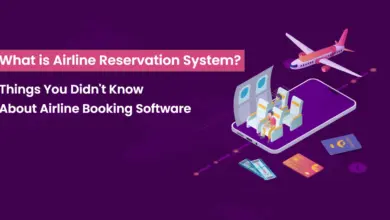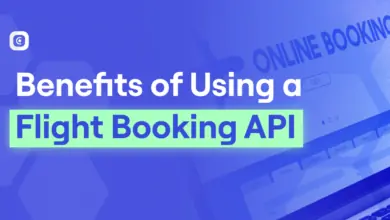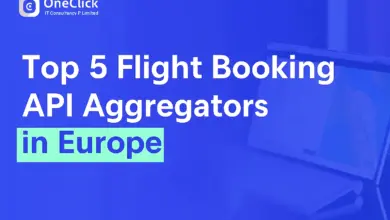Choosing the Flight Reservation Software for Travel Agents
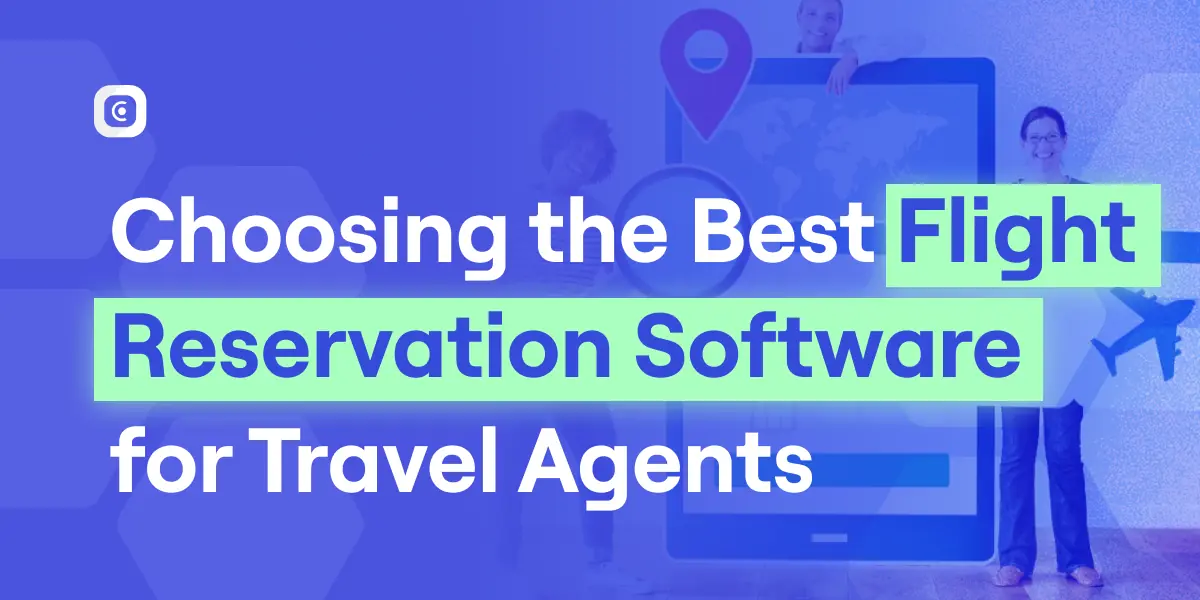
Changes in the travel sector are taking place at a breathtaking pace. Numerous businesses are deploying smart APIs and AI technologies to augment their flight reservation systems. Meeting customer expectations relies heavily on having the best flight ticketing system for travel agents. Advanced smart tools make certain that all travelers’ expectations are met and that businesses do not lose clients, opportunities, or have to invest time in repetitive, manual tasks.
To make the best choice, a booking engine’s linear functionalities, features, scaling, and integrations must be evaluated. Try to aim for a bespoke flight ticket booking software for small travel agencies or large OTAs that aligns with the key interests and objectives of your business.
Flight booking engines have automated various travel and customer service tasks. These technologies have transformed into advanced tools for travel agents and provided a compelling service delivery model. Every travel management company, destination management company, or travel agent operating a B2B or B2C model can deliver great value to their respective audiences.
In the sea of myriad services, all marketing themselves as the pinnacle of efficiency, which flight ticket reservation platform for OTA and tour operators would best suit your portal? Worry not, as this blog is here to assist you in answering this question. We will highlight the essential virtues, concealed traps, and distinct technological advancements such as artificial intelligence and eco-friendly features, that elevate flight booking software for travel consultants.
Power of Choosing the Right Flight Reservation Software for Travel Agents
To illustrate, picture a scenario where a customer requests a flight from New York to Paris and has specific options they wish to consider. While you are manually trying to meet the specifications, a competitor has already given the client what they wanted within a matter of minutes using a flight booking engine with seat selection feature.
This is the reality you will be faced with if you do not modernize your business processes. And the best way to do that is by using a comprehensive flight reservation platform with API integration for agencies that enables users to look for flights on a specific date, check available airlines, select from preferred seats, order ancillaries, view several pricing options, and check out effortlessly.
A contemporary flight booking platform with GDS and LCC integration performs more tasks than simply locating flights. It:
- automates repetitive tasks (ticketing, invoicing, and rebooking),
- provides real-time pricing for more than 900 airlines and Online Travel Agencies,
- tailors offers according to client specifications, and
- protects business margins through smart commission tracking.

8 Core Features Every Flight Ticketing Software Must Have
Let’s move on to the key functionalities critical for running a successful operation, and features that will boost the performance of your B2C or B2B travel booking engine.
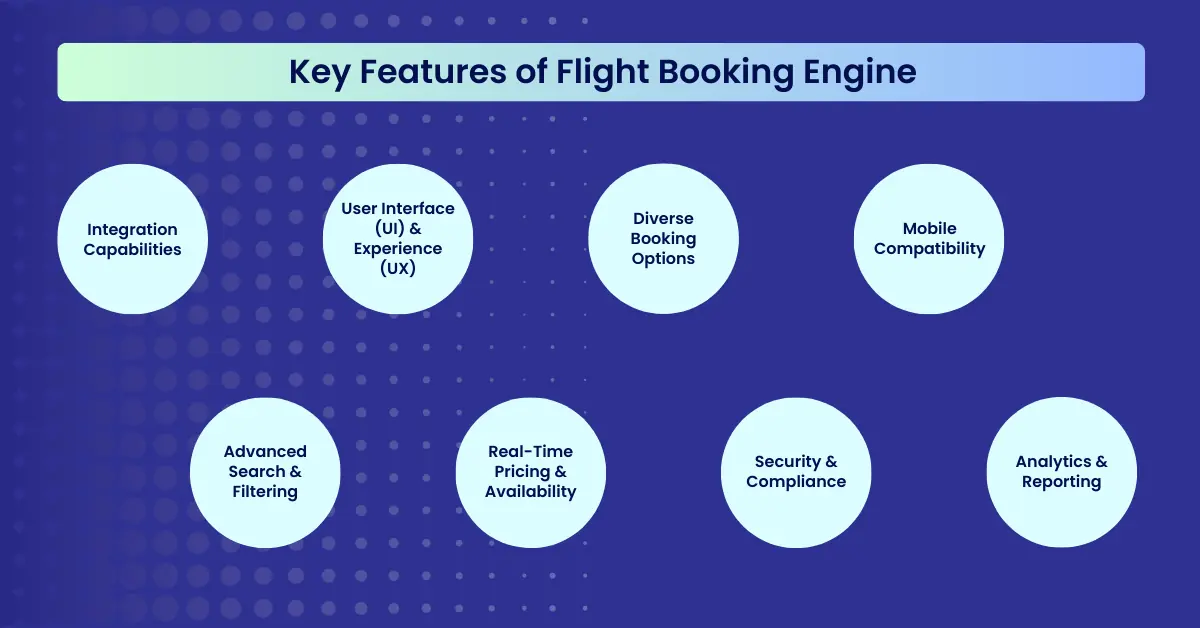
1. Integration Capabilities
While focusing on your flight booking, keep in mind all the integrated features that your booking engine should enable. One of the most important features that a flight booking software should have is a real-time data provision.
It must support the GDS (like Amadeus or Sabre), Salesforce CRM, accounting systems, and even chatbots. A flight reservation system with NDC API support ensures future-ready performance and flexibility.
2. User Interface (UI) & Experience (UX)
Always put yourself in the user’s shoes. There must be significant investment in an airline booking engine with a clean and friendly UI/UX. It must be easy to navigate and user-centric to grant access to all features. To put it simply, it must offer the users:
- No clutter hindering navigation.
- The option to take ticket insurance with a single click.
- A distinct dashboard to track bookings, commissions, and client history.
- The system must be fast in updating the customer data and loading the fares.
3. Flexible Booking Modules
Opt for more advanced flight reservation software solutions for travel crm consultants or agencies that enable you to bundle a variety of services and provide them to your clients in a single package. These comprehensive and all-encompassing solutions enable you to fulfill every client need from a single portal, e.g. flight booking+hotel booking+car rental+other activities. This flexibility will enhance user acquisition.
4. Compatibility With Mobile Phones
A large proportion of users are mobile phone users. Therefore, your solution must be optimized to accept last minute bookings with ease. Consider mobile-responsive websites or a dedicated app that offer your users quick access whenever they need it.
5. Advanced Search & Filtering
Customers should be able to filter their flight preferences right from the start, be it business or economy class. Your flight booking portal should include:
- Multi-city/stopover optimizers.
- Fare class alerts (e.g., notify if business class drops below $X).
- AI-driven recommendations for other services, packages, hotels, rentals, and more
6. Real-Time Pricing & Availability
Your portal should be able to provide real-time fares at the moment of booking. Outdated prices lead to distrust and reduced customer retention. Make sure your engine collects live inventory from LCCs like Southwest, as well as regional airlines and consolidators.
7. Security & Compliance
As digitalization progresses, cybercrime has also expanded greatly. Your portal should safeguard user information from all forms of data theft, as well as payment fraud. Your flight booking system should include these compliance factors:
- PCI-DSS compliance for credit card data.
- Two-factor authentication for agent and customer logins.
- Automated audit trails for GDPR/CCPA compliance.
8. Analytics & Reporting
With your flight booking portal, you should be capable of recognizing customer patterns, enabling you to run targeted ads to increase revenue. The flight booking software should be able to give you vital data like sales and customer preferences so you can use them to anticipate future behavior and forecast demand.

Advanced Considerations Competitors Often Overlook
Although the above features are crucial to making an ideal selection, there are some unusual features that businesses tend to ignore.
Scalability for Growth
To consider the flight booking portal a success, it should be able to accommodate a rush of clients, especially during peak hours. During peak season, there should be an aim of at least 10x booking. OneClick’s custom flight booking systems are designed to scale and handle customer rush easily.
A successful flight reservation software for agencies should handle high traffic during peak hours and festive seasons. Scalability is non-negotiable.
Commission Structures & Hidden Costs
Flight booking engine providers are known for their complicated pricing schemes. Flight ticket booking engines that use hidden pricing tend to create expensive deals over time. Always go for subscription-based pricing models on one-time payment models to maintain transparency. OneClick’s subscription-based pricing model makes their airline reservation systems accessible, affordable and rich in features.
Customer Adaptability
In the wake of something as life altering as the global pandemic of COVID19, flexible booking options have become the norm. This is particularly true for those customers who have the potential of cancelling their flights or need to reschedule them due to some unexpected situation. Therefore, for your travel portal prioritize engines with auto-rebooking tools for canceled flights.
Customer Support & Training
Customer support is yet another important feature that you should not overlook while choosing a flight reservation software for your travel portal. To meet the primary customer expectations, the platform should have 24/7 support with multilingual speaking capability through chatbots like the ones offered by OneClick. This will aid you in deepening your customer relationships.
Eco-Friendly Booking Options
A big portion of the population has started to make decisions keeping environmental impact in mind – that includes booking flights. Therefore, booking engines for travel agents should provide the capability to list those that are eco-friendly, which are optimized to calculate a traveler’s carbon footprint for each itinerary, and notify the traveler. In addition, select flight booking APIs that are partnered with eco-friendly airlines.
Flight Booking System Evaluation Checklist for Agencies & OTAs
To help you further, here’s a quick breakdown of evaluating airline booking engines properly and making an informed decision.
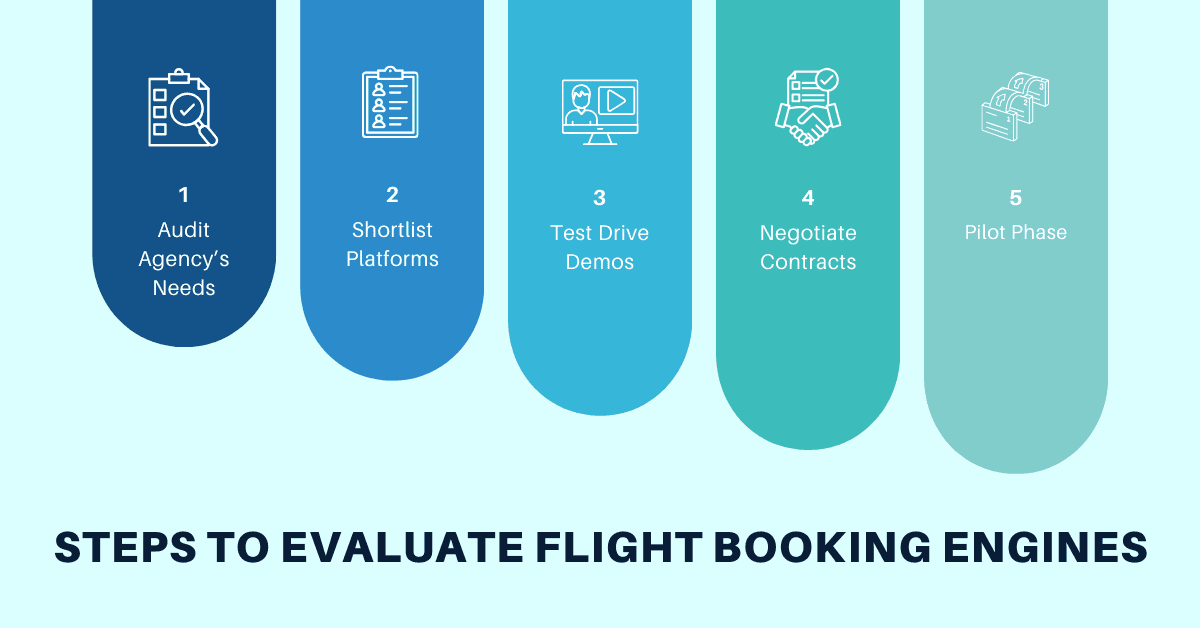
Step 1: Audit Your Agency’s Needs
Make sure to scan through your evaluation properly to identify all your requirements and your audience. Pick a category – would you serve general clients and somebody who regularly uses your service? Luxury passengers? Corporate travelers? While making this decision also note down the features you would want included in your booking engine.
Step 2: Conduct Preliminary Research
After that is done, your next step is to go make an internet search. Try to match your suppliers with your requirements. Achieving your targets in an economical manner is also very crucial. Go for reliable partners who have been in the market for over a decade.
Step 3: Device a Test Plan
After that step: Go organize an onboarding meeting. You are to formally present your requirements and ask for the user interface’s acceleration and flexibility along with its customization.
Step 4: Finalize Agreements
Move forward and settle on your most preferred and economical plan and proceed towards the integration of the flight booking system on your site. Validate functionality for all features – make sure all functions are fully operational and as expected.
Step 5: Pilot Phase
Lifting the testing restriction requires a separate team to take a test ride of the portal. Doing so will surface issues that can be resolved prior to full rollout.
What Makes OneClick’s Flight Booking System Unique?
While it may be that other providers succeed in offering the necessary components to their customers, it is OneClick that elevates the expectations of what a flight booking System can accomplish. Observe this:
1. Customized Dynamic Packages for Greater Revenue
Achieve greater profitability with tailored packages. In contrast to most of the competing companies providing B2B flight model and B2C flight model, which fully subscribe to fixed bundles, our customers will be able to differentiate themselves with packages such as “Holiday Special: Flight + Hotel+ Car Rental+ Activities”.
2. Global Reach
Serve customers beyond geographical borders with the same level of quality and service. Our solutions come with multi-currency and multi-language features, making it suitable for every country.
3. Live Agent Assist
Booking assistance with our specialists can be provided to customers to help with any flight booking concerns that they may have
4. Exclusive Airline Partnerships
Access to more than 500 airlines is possible with our partnerships with several prominent GDSs, OTAs, tour operators and aggregators.
5. Zero Downtime Guarantee
With 24/7 monitoring and 99.99% uptime, OneClick guarantees that you will never lose a booking due to a technical problem. Our systems are built to help improve your customer satisfaction rate over time and work effortlessly, without any manual adjustments.

Empower Your Agency with Flight Booking Solutions
Choosing the best flight booking software for travel agents means more than just checking a list. It means investing in technology that can evolve with your business.
When looking for a flight booking engine companies, you should consider it a tool to bolster business expansion rather than a mere investment. It is vital to consider the best flight booking software that performs effectively, because those that are merely functional lack important supplemental tools that provide additional benefits. Your agency can shift from being a simply transactional business to a responsive partner with the help of AI-driven insights and eco-friendly tools with the right flight booking system.
Ensure that innovation and the ability to adapt to changing business landscapes are priorities when choosing a flight booking system. One of the most important questions is: what are the desirable flight booking software features? Positive foresight is a key feature of OneClick.
From flight booking software with API integration for agencies to those offering seat selection, live fares, and NDC API support, OneClick brings a blend of power and personalization. Contact us for more details
FAQs
The best flight reservation software for travel agencies—notably the one provided by OneClick will automate change management using specified workflows. Whether it is a ticket change, refund or rebooking, the system cuts effort and response time, to improve customer service levels for travel consultants’ and OTA’s..
An AI-powered flight reservation software for agencies uses artificial intelligence and machine learning to deliver predictive pricing, personalized offers, and smarter seat selection. This creates a more dynamic, efficient, and customer-centric experience—especially useful for flight booking platforms serving corporate and leisure clients.
Yes. A robust flight booking software with API integration for agencies can seamlessly interface with CRMs, ERPs, payment gateways, and other third-party travel tech systems. This is essential for OTAs and tour operators aiming for operational efficiency and system scalability.
Ongoing expenses depend on the provider and typically include subscription fees, per-booking charges, integration support, and maintenance. Transparent pricing is key—OneClick offers flexible models ideal for small travel agencies scaling their operations.
To evaluate ROI, monitor metrics such as increased booking volume, reduced operational errors, customer retention, and saved manual hours. A flight reservation system with GDS and LCC integration can drastically improve efficiency and profitability by offering wider airline coverage and real-time pricing.
A flight reservation system with NDC API support enables direct, personalized offers from airlines, including ancillaries like seat selection, baggage, and upgrades. This empowers travel agents and OTAs to deliver rich content and upsell opportunities, maximizing revenue per booking.
Offering preferred seating is a growing customer demand. A flight booking software with a seat selection feature enhances user satisfaction and gives travel consultants a competitive edge by providing more control over itinerary customization.


